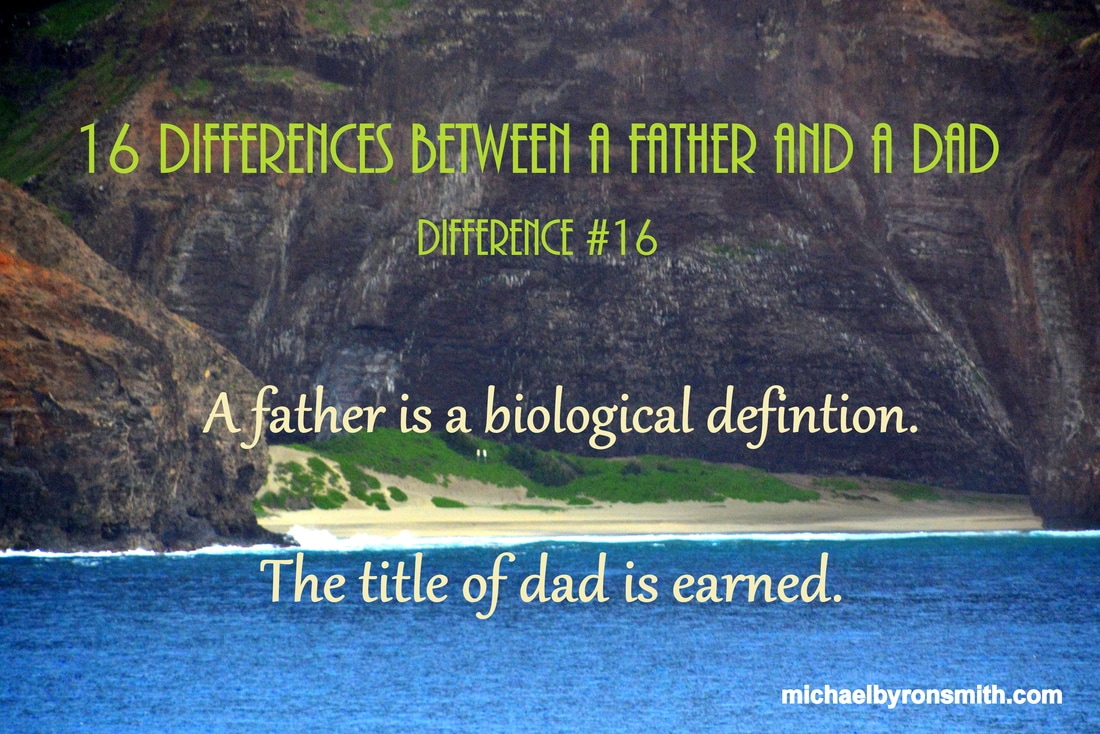The last of my “Sixteen Differences Between a Father and a Dad” captures the essence of the previous fifteen. Any man can be a father, but not every father is a dad. Being a dad means being around both physically and emotionally. Listening, caring, showing love, watching, teaching, disciplining, praising and so much more.
If there is a theme to the sixteen differences cited, it would be engagement. Engagement between a father and his children in the ways mentioned and more. It’s that simple.
I would like to end “The Sixteenth Difference” with two passages from Chapter 9 “Fathering with Love” from my book, “The Power of Dadhood: How to Become the Father Your Child Needs”
“If you want a slingshot, I hope your dad teaches you how to make one instead of buying one.”
--Paul Harvey
You know what I wanted from my Dad? I wanted him to put his arm behind my back, grab my shoulder, and pull me into him—the kind of side-by-side hug Dads give. A simple act of caring can go a long way, and dads sometimes forget to do this, especially with their sons. Probably the most important thing your children need to learn from you is that you care. All children need a Dad to play with, to ask how they’re doing, and to be ready to listen when they are excited, sad, or afraid. Not fulfilling such a basic need for your children can do immeasurable harm.
By giving your children your attention, they will have evidence of their self-worth. They will know someone cares for them besides Mom, and they will have someone to impress. We know that Moms and Dads often show caring in different ways. Generally, Moms soothe while Dads prepare. Moms protect and Dads challenge. Moms are often overlooked and taken for granted by their children, while Dads who interact tend to be more appreciated, especially when compared to less-involved dads. Make your relationship a standard for how a father-to-son or father-to-daughter relationship should be.
Caring, however, is not all comfort and attention. Caring is putting your foot down, too. Children need you to be their Dad, not just a friend. Hopefully, they will have plenty of others who will fulfill that role. Certainly you should be kind and warm, but you have responsibilities beyond friendship. Caring involves direction, correction, and measured discipline. Like taking foul-tasting medicine, your children may not like what you have to say at the time, but they will appreciate it later and be thankful. All children want direction.”
And…..
GIVE YOUR KIDS THE FATHER THEY REALLY WANT
“Children need love, especially when they do not deserve it.”
—Harold Hulbert
Kids don’t always know it, but they want your love and your direction.
They want to know what the limits are. Young brains cannot judge danger because kids feel invincible. Children need to know the rules to succeed in society and need to have principles to base their decisions on. Having principles contributes to their self-esteem.
Children must learn that when no respect is given, no respect will be received; when no work is accomplished, no rewards will be forthcoming. When they fight you on the limits, dangers, rules, and principles you teach, don’t interpret that as their desire for you to go away. They may think they want you to leave them alone, but if you did, they would be hurt deeply. Mostly, your kids need love and guidance, and you give them these gifts by being consistent and firm with them.
Too many times I have seen parents take the easy road and solve their children’s problems for them. It’s the easy way out for the parents because the issue goes away quicker and with less effort. What’s worse, it’s also the easy way out for the child because he or she is off the hook with little or no consequence and without learning life’s lessons.
If you want your children to be stronger, you don’t take them to the gym and lift the weights for them. If you want them to be smarter, you don’t go to class for them and do their homework. Similarly, if you want them to learn the rules of life, you don’t protect them from life. You must provide the way—give them a map and the rules of the road, but don’t take the journey for them because they will not get anywhere that way. There must be consequences or there is no learning, and there must be boundaries to keep them on the right path.
I began the “16 Differences” with just a quote on a photo. It wasn’t until “Difference #8” that I began writing articles on the quotes. These articles can be found on “Helping Fathers to Be Dads” every day between March 11th and March 19th, 2017
It is my intention to write articles on the first seven differences, although they will be published once a week, not every day.
Thanks to all of you that have reached this sentence, because I know you care deeply about your children!!
Mike






